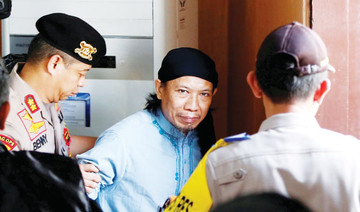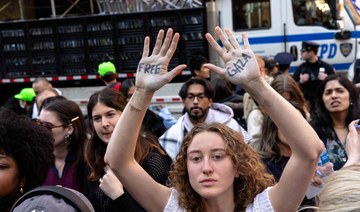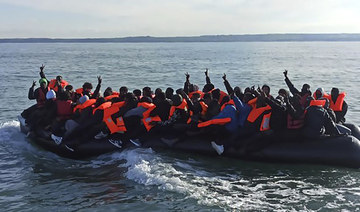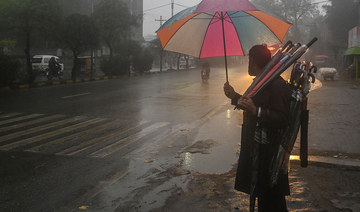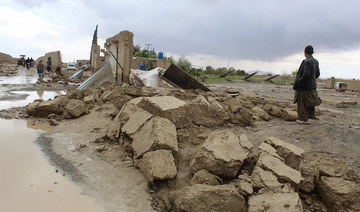JAKARTA: About 100 residents of a gritty commercial district of Indonesia’s capital listen intently as a man roars into a microphone: “Are you ready to change our president? Are you ready for new leadership?“
But this is not a political rally. Dressed in white robes and a turban, Novel Bamukmin of the Jakarta chapter of the Islamic Defenders Front (FPI), a hard-line Islamist group, addresses evening prayers in a mosque.
As a year of local and then national elections begins this week in the world’s biggest Muslim-majority country, some Islamic leaders have emerged as the most vocal opponents of President Joko Widodo, who is expected to seek a second term next year.
They belong to a loose grouping of Islamists behind protests that culminated in the election defeat and jailing for blasphemy in 2017 of Jakarta’s ethnic-Chinese and Christian governor, Basuki TjaHajja Purnama, a Widodo ally.
The case of Purnama, who had said political rivals were deceiving people by using a verse in the Qur’an to say Muslims should not be led by a non-Muslim, showed how Islam had crept into politics in the officially secular country.
Widodo has pledged to protect Indonesia’s tradition of pluralism and moderate Islam, and he has banned Hizb ut-Tahrir, a hard-line group with ambitions for an Islamic caliphate.
But a senior government official conceded there are limits to how much the government can control political messaging in mosques.
“Any action against this phenomenon is blasted as anti-Muslim so our actions are restricted,” said the official, who declined to be identified because of the sensitivity of the issue.
‘Change the president’
A former furniture maker and Indonesia’s first president from outside the political and military elite, Widodo — known as Jokowi — has remained popular since he took office in 2014.
He is widely seen as an honest man of the people, rare for a leader in a country where the political class is scorned as corrupt and aloof, and his push for infrastructure and cutting red tape has burnished his image as a hands-on leader.
A recent opinion poll gave him a double-digit lead over the opposition Gerindra party’s Prabowo Subianto, a retired general who is expected to run a second time against Widodo in 2019.
Opponents and hard-line Muslim groups, including the FPI, accuse Widodo of failing to stem income inequality or deliver higher growth, but the most incendiary attacks have often been around religion and ethnicity.
False accusations have spread on social media that the president is not actually Muslim and is a descendant of ethnic Chinese communists.
Widodo has sought to strengthen his ties with moderate Islamic leaders and he recently appointed a controversial hard-line cleric as a communications adviser.
“The only way for the opposition to win is to debunk the argument that Jokowi is one of the masses, and to attack his weakest spot, which is his shyness in showing his religion,” said Achmad Sukarsono, a political analyst at Control Risks.
Ahead of local elections across much of the country on Wednesday, the anti-Widodo sentiment has crystallized into a movement called “#GantiPresiden2019” or “Change the president in 2019.”
The movement’s founder, Mardani Ali Sera, a member of parliament from a conservative Islamic party, says he has no connection with political messaging in mosques.
But he says the majority of those affiliated with his movement are from Islamic parties and the groups that opposed Jakarta’s Christian governor.
“We don’t use mosques but if the hashtag and the movement works for you, then go ahead and use it,” Sera, who is active on social media, told Reuters.
The FPI’s Bamukmin supports the #GantiPresiden2019 movement and said he and other preachers push that message in sermons.
“It is the duty of Muslims to try and replace the current president who has betrayed the country and his religion,” he said, accusing Widodo of “selling the country to foreigners” and “empowering communists and deviant religious sects.”
No campaigning allowed
Indonesia’s election laws prohibit political campaigning in places of worship ahead of polls.
Vice President Jusuf Kalla told media political discussion is allowed in mosques because they are places of education as well as worship, but campaigning is not.
Tens of millions of Indonesians will vote in 171 elections for mayors, regents, and governors on Wednesday, an important barometer ahead of presidential and parliamentary elections in 2019.
Opinion polls suggest candidates backed by parties supporting Widodo will win in many parts of Java, Indonesia’s most populous island, but observers will be watching for signs of Islamist influence.
One man who attended FPI preacher Bamukmin’s sermon in Jakarta this month, said even if clerics were becoming more political, their congregations were smart enough to decide for themselves.
“People just listen to the good points and ignore the rest,” said Huda, 27.
Indonesian election season is a gauge of rise of political Islam
Indonesian election season is a gauge of rise of political Islam
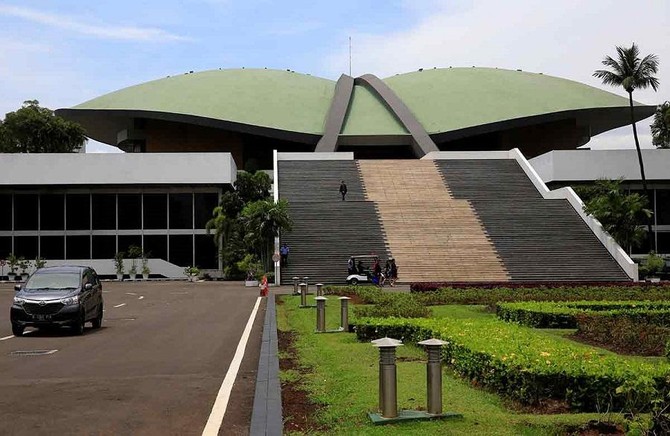
Wave of pro-Palestinian campus protests in US meets forceful response
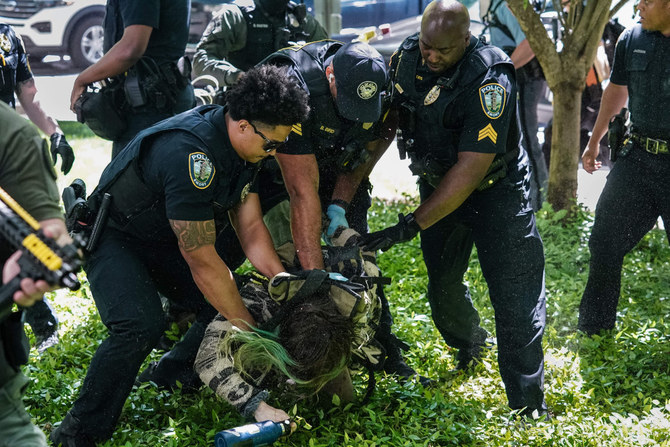
- Students protesters tasered and teargassed in Atlanta and "swept away" in Austin, Texas
- More than 530 arrests have been made in the last week across major US universities in relation to protests over Gaza
Students protesters tasered and teargassed in Atlanta and "swept away" in Austin, Texas
More than 530 arrests have been made in the last week across major US universities in relation to protests over Gaza
NEW YORK: Fresh clashes between police and students opposed to Israel’s war in Gaza broke out on Thursday, raising questions about forceful methods being used to shut down protests that have intensified since mass arrests at Columbia University last week.
Over the past two days, law enforcement at the behest of college administrators have deployed Tasers and tear gas against students protesters at Atlanta’s Emory University, activists say, while officers clad in riot gear and mounted on horseback have swept away demonstrations at the University of Texas in Austin.
At Columbia, the epicenter of the US protest movement, university officials are locked in a stalemate with students over the removal of a tent encampment set up two weeks ago as a protest against the Israeli offensive.
The administration, which has already allowed an initial deadline for an agreement with students to lapse, has given protesters until Friday to strike a deal.
Other universities appear determined to prevent similar, long-running demonstrations to take root, opting to work with police to shut them down quickly and in some cases, with force.
Overall, more than 530 arrests have been made in the last week across major US universities in relation to protests over Gaza, according to a Reuters tally. University authorities have said the demonstrations are often unauthorized and called on police to clear them.

At Emory, police detained at least 15 people on its Atlanta campus, according to local media, after protesters began erecting a tent encampment in an attempt to emulate a symbol of vigilance employed by protesters at Columbia and elsewhere.
The local chapter of the activist group Jewish Voice for Peace said officers used tear gas and Tasers to dispense the demonstration and take some protesters into custody.
Video footage aired on FOX 5 Atlanta showed a melee breaking out between officers and some protesters, with officers using what appeared to be a stun gun to subdue a person and others wrestling other protesters to the ground and leading them away.
“Several dozen protesters trespassed into Emory University’s campus early Thursday morning and set up tents,” the school wrote in response to an emailed request for comment. It described the protesters as “activists attempting to disrupt our university,” but did not comment directly on the reports of violence.
Atlanta police did not immediately respond to inquiries about the number of protesters who were detained or about reports over the use of tear gas and stun guns.
Similar scenarios unfolded on the New Jersey campus of Princeton University where officers swarmed a newly-formed encampment, video footage on social media showed.
Boston police earlier forcibly removed a pro-Palestinian encampment set up by Emerson College, arresting more than 100 people, media accounts and police said. The latest clashes came a day after police in riot gear and on horseback descended on hundreds of student protesters at the University of Texas at Austin and arrested dozens of them.
But prosecutors on Thursday dropped charges against most of the 60 people taken into custody, mostly on misdemeanor charges of criminal trespassing and disorderly conduct, and said they would proceed with only 14 of those cases.
In dropping the charges, the Travis County district attorney cited “deficiencies in the probable cause affidavits.”
‘Alarming reports’
Human Rights Watch and the American Civil Liberties Union have condemned the arrest of protesters and urged authorities to respect their free speech rights.
But some Republicans in Congress have accused university administrators of allowing Jewish students to be harassed, putting increasing pressure on schools to tightly control any demonstrations and to block any semi-permanent encampment.
US Education Secretary Miguel Cardona on Thursday said his department was closely monitoring the protests, including what he called “very alarming reports of antisemitism.”
In response, activist groups have strongly denied that the protests are antisemitic. Their aim is to pressure universities from divesting from companies that contribute to the Israeli military actions in Gaza, they say.
Even so, protest leaders have acknowledged that hateful rhetoric has been directed at Jewish students, but insist that people who tried to infiltrate and malign their movement are responsible for any harassment.

Friday deadline at Columbia
At Columbia, officials have given protesters until 4 a.m. on Friday to reach an agreement with the university on dismantling dozens of tents set up on the New York City campus in a protest that started a week ago.
An initial deadline of midnight Tuesday came and went without an agreement, but administrators extended it for 48 hours, citing progress in the talks.
The university already tried to shut the protest down by force. On April 18, Columbia President Minouche Shafik took the unusual move of asking police to enter the campus, drawing the ire of many rights groups, students and faculty.
More than 100 people were arrested and the tents were removed from the main lawn. But within a few days, the encampment was back in place, and the university’s options appeared to narrow.
Protesters have vowed to keep the protests going until their universities agree to disclose and divest any financial holdings that might support the war in Gaza, and grant amnesty to students suspended from school during the demonstrations.
Student protesters have also demanded that the US government rein in Israeli strikes on civilians in Gaza, which have killed more than 34,000 people, according to Palestinian health authorities. Israel is retaliating against an Oct. 7 Hamas attack that killed 1,200 people and led to 253 taken hostage, according to Israeli tallies.
Macron blasts ‘ineffective’ UK Rwanda deportation law

PARIS: French President Emmanuel Macron on Thursday said Britain’s plan to send asylum seekers to Rwanda was “ineffective” and showed “cynicism” while praising the two countries’ cooperation on defense.
“I don’t believe in the model ... which would involve finding third countries on the African continent or elsewhere where we’d send people who arrive on our soil illegally, who don’t come from these countries,” Macron said.
“We’re creating a geopolitics of cynicism which betrays our values and will build new dependencies, and which will prove completely ineffective,” he added in a wide-ranging speech on the future of the European Union at Paris’ Sorbonne University.
British MPs on Tuesday passed a law providing for undocumented asylum seekers to be sent to Rwanda, where their asylum claims would be processed and where they would stay if the claims succeed.
The law is a flagship policy for Prime Minister Rishi Sunak’s government, which badly lags the opposition Labour Party in the polls, with an election expected within months.
Britain pays Paris to support policing of France’s northern coast, which aims to prevent migrants from setting off for perilous crossings in small boats.
Five people, including one child, were killed in an attempted crossing Tuesday, bringing the toll on the route so far this year to 15 — already higher than the 12 deaths in 2023.
But Macron had warm words for London when he praised the two NATO allies’ bilateral military cooperation, which endured through the contentious years of Britain’s departure from the EU.
“The British are deep natural allies (for France), and the treaties that bind us together ... lay a solid foundation,” he said.
“We have to follow them up and strengthen them because Brexit has not affected this relationship,” Macron added.
The president also said France should seek similar “partnerships” with fellow EU members.
US alarmed by signs of ‘imminent military offensive’ in Darfur

WASHINGTON: The US has warned of a looming rebel military offensive on the Sudanese city of El-Fasher. This humanitarian hub appears to be at the center of a newly opening front in the country’s civil war.
After a year of fighting between the armed forces of Gen. Abdel Fattah Al-Burhan and the paramilitaries of the Rapid Support Forces, under Gen. Mohammed Hamdan Dagalo, millions have been displaced in the northeastern African country.
Until recently, El-Fasher — the last Darfur state capital not under RSF control — had been relatively unaffected by the fighting, hosting a large number of refugees.
But since mid-April, bombardments and clashes have been reported in the city and surrounding villages. The US “calls on all armed forces in Sudan to immediately cease attacks in El-Fasher,” the State Department said.
“We are alarmed by indications of an imminent offensive by the Rapid Support Forces and its affiliated militias,” it said, adding that “an offensive against El-Fasher city would subject civilians to extreme danger.”
After several days of “arbitrary shelling and airstrikes” in the city and its outskirts, a pro-democracy lawyers’ committee reported last week that at least 25 civilians had been killed.
Clashes in the eastern and northern parts of the city have already resulted in 36,000 displaced people, according to the UN’s Office for the Coordination of Humanitarian Affairs.
As the war enters its second year, the UN and US have warned the breakdown of the fragile peace in El-Fasher would be catastrophic.
The city functions as the main humanitarian hub in the vast western region of Darfur, home to around a quarter of Sudan’s 48 million people and the site of harrowing violence during this and previous conflicts.
The State Department said it had seen “credible reports” that the RSF and affiliated militias had razed multiple villages west of the city, while it condemned “reported indiscriminate aerial bombardments” in the region by Sudan’s armed forces.
Death toll in migrant boat capsize off Djibouti rises to 24: UN agency
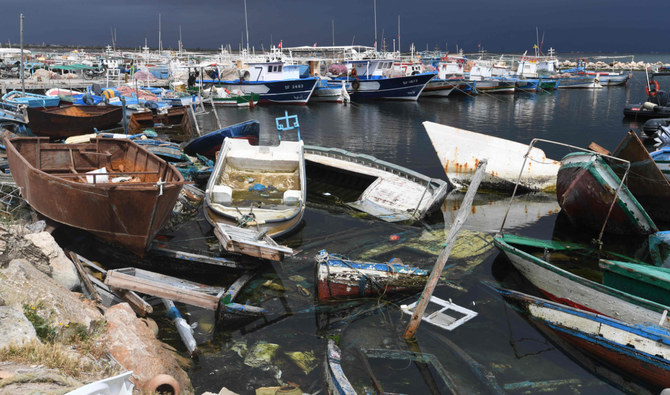
- 20 remain missing after the boat carrying at least 77 migrants, including children, capsized near the town of Obock
NAIROBI: The death toll from a migrant boat disaster off Djibouti this week has risen to 24, the UN’s migration agency said, highlighting a sharp increase in the number of people returning from Yemen to the Horn of Africa nation this year.
The capsize on Monday was the second fatal maritime accident in two weeks off Djibouti, which lies on the perilous so-called Eastern Migration Route from Africa to the Arabian Peninsula.
At least 24 people died, and 20 remain missing after the boat carrying at least 77 migrants, including children, capsized near the town of Obock, the International Organization for Migration said.
It said 33 survivors were being cared for at an IOM center in Obock and that local authorities are conducting search and rescue operations in the hope of finding more people alive.
Addis Ababa’s ambassador to Djibouti had said those on the boat were Ethiopian migrants.
Another vessel also carrying mainly Ethiopian migrants sank in the same area on April 8, with a death toll of at least 38.
“The occurrence of two such tragedies within two weeks highlights the dangers faced by children, women, and men migrating through irregular routes, underscoring the importance of establishing safe and legal pathways for migration,” IOM chief of mission in Djibouti, Tanja Pacifico, said.
The IOM said it had recorded a total of 1,350 deaths on the Eastern Route since 2014, not including this year.
In 2023 alone, it said it documented at least 698 deaths along the route, including 105 lost at sea.
The agency believed the people on both ill-fated vessels were attempting to return from Yemen to Djibouti.
Each year, tens of thousands of African migrants brave the Eastern Route across the Red Sea to reach Gulf nations, escape conflict or natural disaster, or seek better economic opportunities.
However, many are unsuccessful and “thousands are stranded in Yemen where they experience extremely harsh conditions,” the IOM said.
Since the start of 2024, the agency said 3,682 migrants have left Yemen for Djibouti, more than double the figure for the same period last year.
155 killed in Tanzania as heavy rains lash East Africa
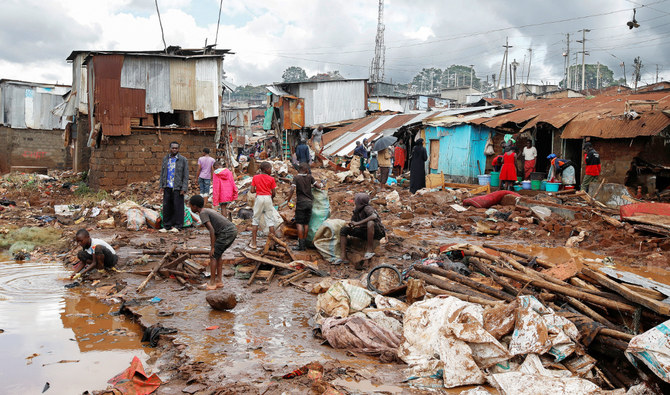
- Kenyan president convenes emergency multi-agency meeting to respond to crisis after floods cause chaos
DAR ES SALAAM, Tanzania: At least 155 people have died in Tanzania as torrential rains linked to El Nino triggered flooding and landslides, Prime Minister Kassim Majaliwa said on Thursday.
Tanzania and other countries in East Africa — a region highly vulnerable to climate change — have been pounded by heavier than usual rainfall during the current rainy season, with dozens of deaths also reported in Kenya.
Majaliwa said the rains have affected more than 51,000 households and 200,000 people, with 155 fatalities and 236 injuries.
“The heavy El Nino rains, accompanied by strong winds, floods, and landslides in various parts of the country, have caused significant damage,” Majaliwa told parliament in Tanzania’s capital, Dodoma.
He added: “These include loss of life, destruction of crops, homes, citizens’ property, and infrastructure such as roads, bridges, and railways.”
El Nino is a naturally occurring climate pattern typically associated with increased heat worldwide, drought in some parts of the world, and heavy rains elsewhere.
It can have a devastating impact on East Africa.
In Burundi, around 96,000 people have been displaced by months of relentless rains.
In addition, about 45 people have been killed in Kenya since the start of the rainy season in March, including 13 who lost their lives in flash floods in the capital, Nairobi, this week.
Kenyan President William Ruto convened an emergency multi-agency meeting on Thursday to respond to the crisis after torrential rains triggered floods that caused chaos across the city, blocking roads and bridges and engulfing homes in slum districts.
Kenyans have been warned to stay on alert, with more heavy rains forecast across the country. Officials said people living in the most vulnerable areas would be relocated.
“The government ... will do whatever it takes, apply all the required resources in terms of money and personnel to make sure that lives are not lost and the people of Kenya are protected from this disaster,” Deputy President Rigathi Gachagua told a press briefing.
Meanwhile, the UN humanitarian response agency OCHA said in an update this week that in Somalia, the Gu (April to June) rains are intensifying, with flash floods reported since April 19.
It said four people had been reportedly killed, and at least 134 families or more than 800 people were affected or displaced across the country.
Late last year, more than 300 people died in torrential rains and floods in Kenya, Somalia, and Ethiopia just as the region was trying to recover from its worst drought in four decades that left millions of people hungry.
From October 1997 to January 1998, massive floods caused more than 6,000 deaths in five countries in the region.
In March, the UN’s World Meteorological Organization said that El Nino, which peaked in December, was one of the five strongest ever recorded.
Though the weather pattern is gradually weakening, its impact will continue over the coming months by fueling the heat trapped in the atmosphere by greenhouse gases, it said.
Therefore, the WMO said in a quarterly update that “above normal temperatures are predicted over almost all land areas between March and May.”



